外研版(2019) 必修 第一册Unit 1 A New Start Understanding ideas教学课件(共47张PPT)
文档属性
| 名称 | 外研版(2019) 必修 第一册Unit 1 A New Start Understanding ideas教学课件(共47张PPT) |

|
|
| 格式 | pptx | ||
| 文件大小 | 5.3MB | ||
| 资源类型 | 教案 | ||
| 版本资源 | 外研版(2019) | ||
| 科目 | 英语 | ||
| 更新时间 | 2024-03-29 00:00:00 | ||
图片预览

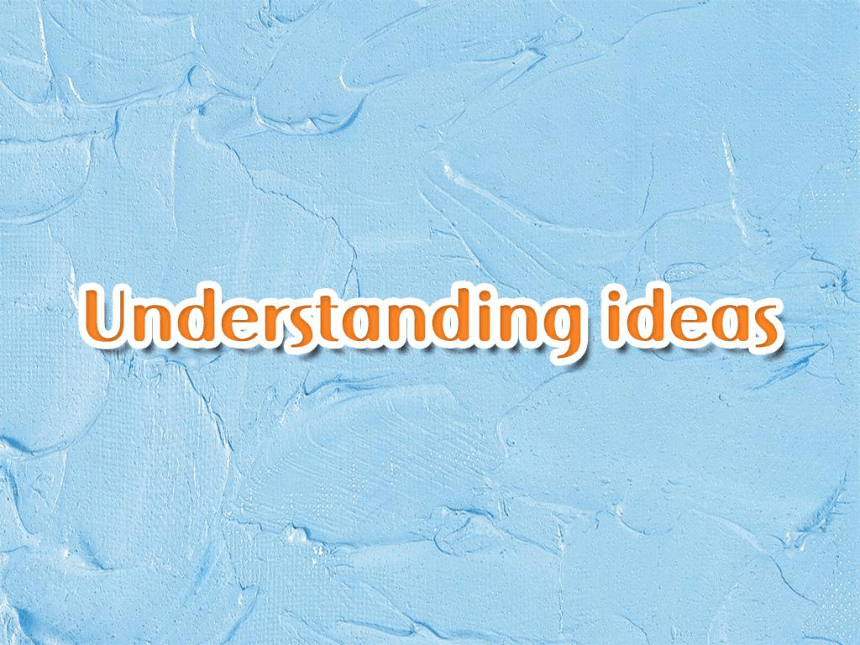
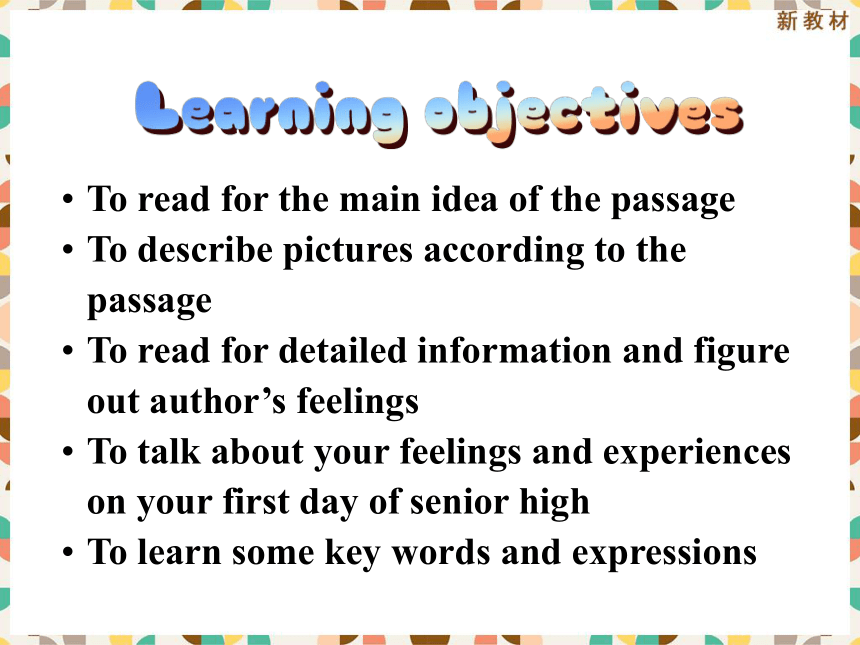

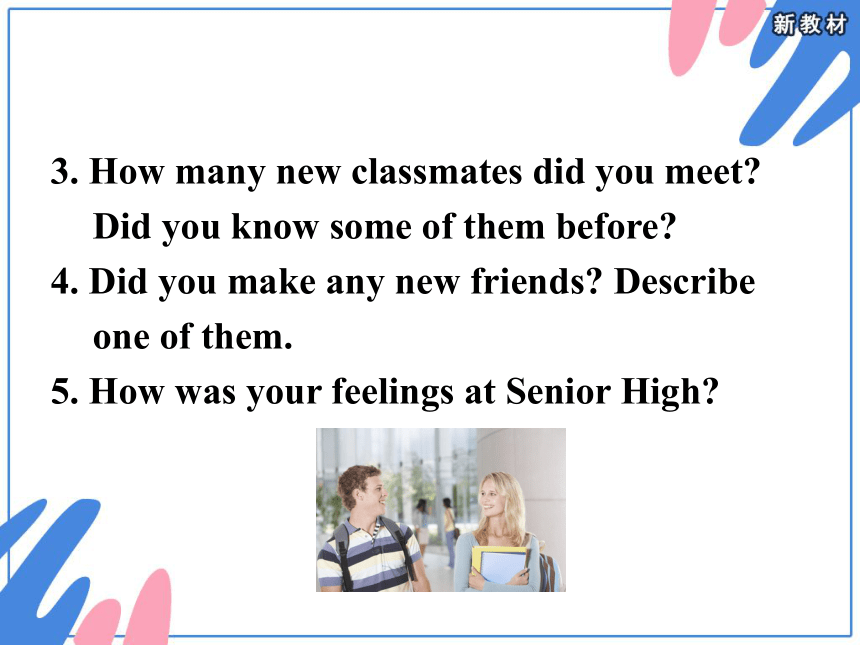
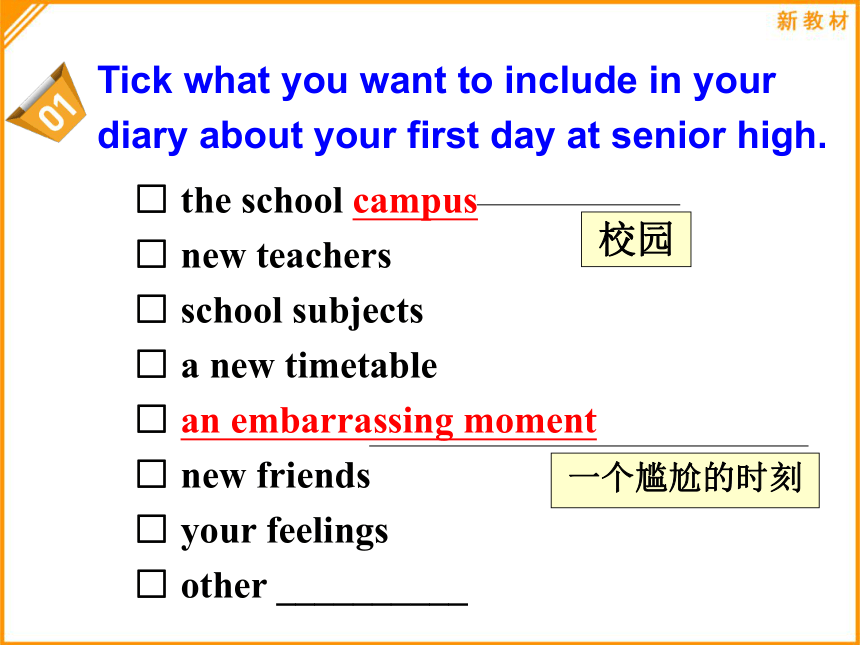
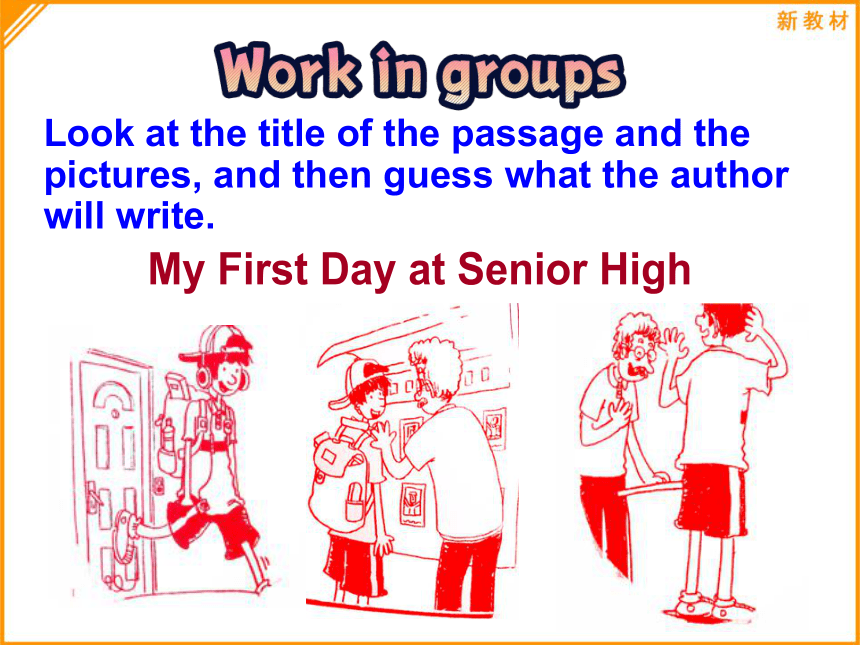
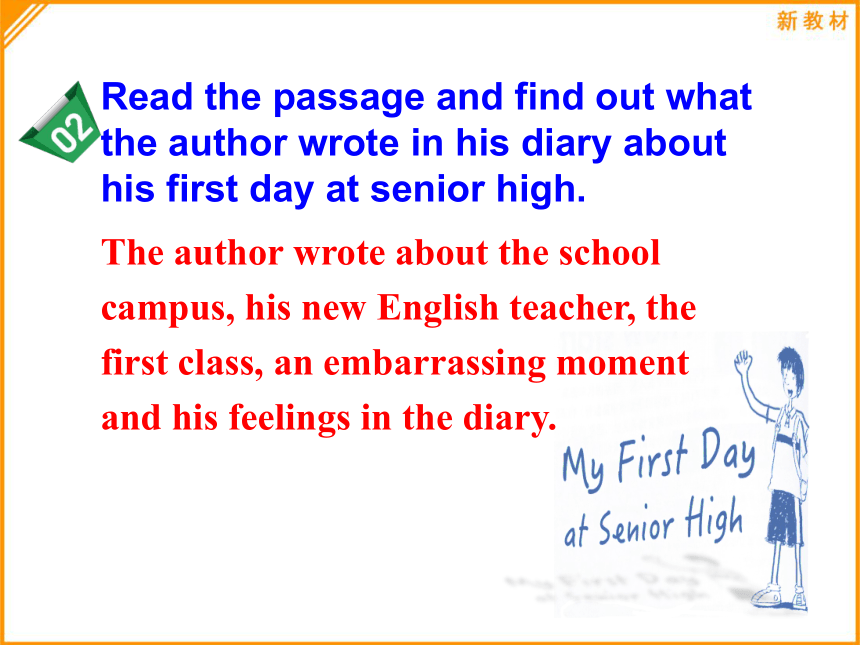
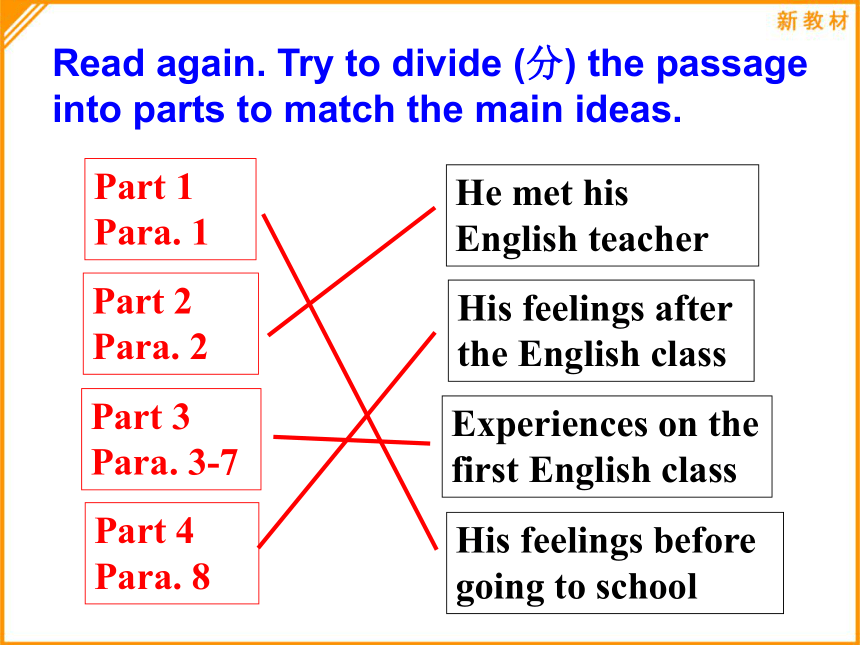
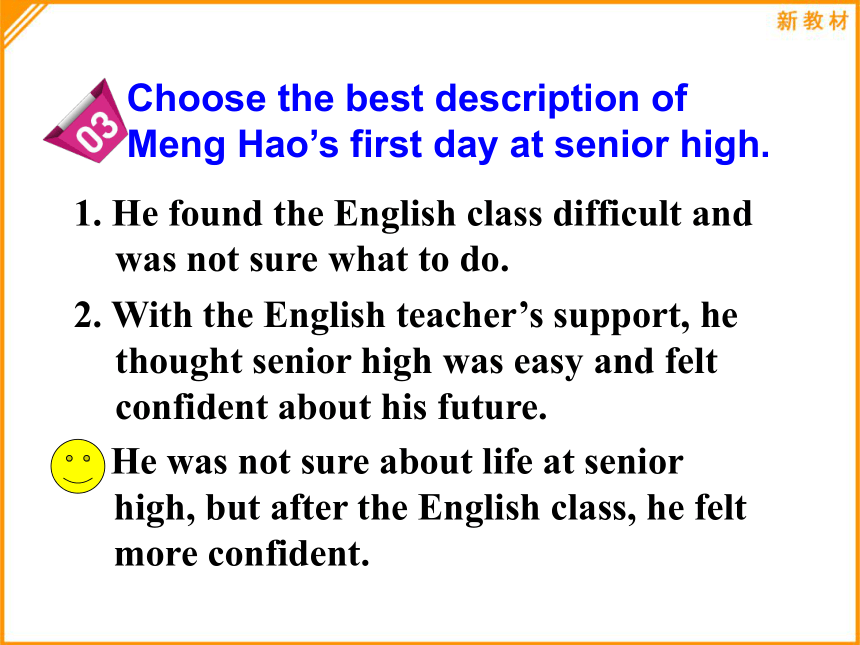
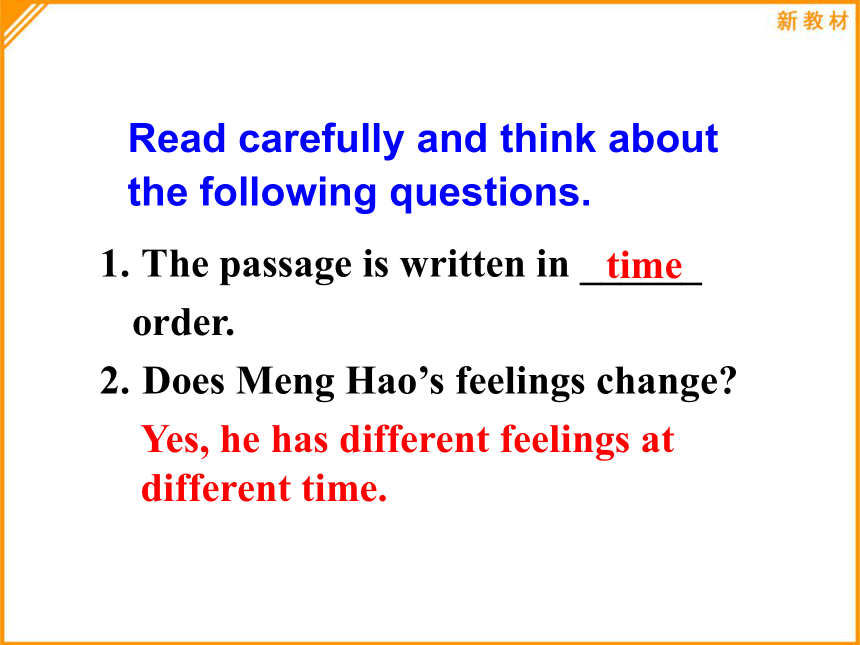
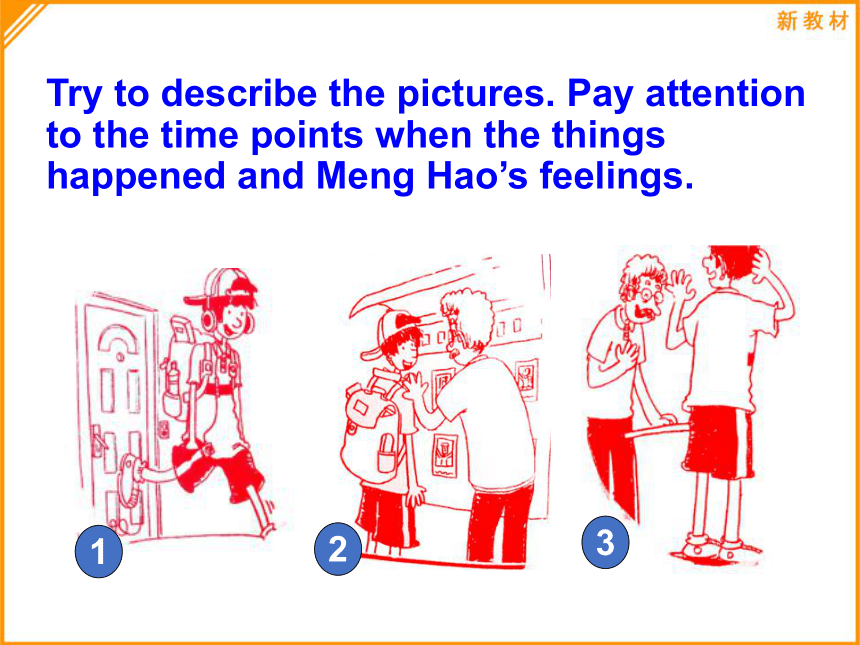
文档简介
(共47张PPT)
Unit 1 A New Start
To read for the main idea of the passage
To describe pictures according to the passage
To read for detailed information and figure out author’s feelings
To talk about your feelings and experiences on your first day of senior high
To learn some key words and expressions
What did you do on your first day of senior high school How did you feel Share your experience:
1. When did you get to school How did you get here
2. What classes do you have Tell us the ones you are interested in.
3. How many new classmates did you meet Did you know some of them before
4. Did you make any new friends Describe one of them.
5. How was your feelings at Senior High
Tick what you want to include in your diary about your first day at senior high.
□ the school campus
□ new teachers
□ school subjects
□ a new timetable
□ an embarrassing moment
□ new friends
□ your feelings
□ other __________
校园
一个尴尬的时刻
Look at the title of the passage and the pictures, and then guess what the author will write.
My First Day at Senior High
Read the passage and find out what the author wrote in his diary about his first day at senior high.
The author wrote about the school campus, his new English teacher, the first class, an embarrassing moment and his feelings in the diary.
Read again. Try to divide (分) the passage into parts to match the main ideas.
His feelings before going to school
He met his English teacher
Experiences on the first English class
His feelings after the English class
Part 1
Para. 1
Part 2
Para. 2
Part 3
Para. 3-7
Part 4
Para. 8
Choose the best description of Meng Hao’s first day at senior high.
1. He found the English class difficult and was not sure what to do.
2. With the English teacher’s support, he thought senior high was easy and felt confident about his future.
3. He was not sure about life at senior high, but after the English class, he felt more confident.
The passage is written in ______ order.
Does Meng Hao’s feelings change
Read carefully and think about the following questions.
time
Yes, he has different feelings at different time.
Try to describe the pictures. Pay attention to the time points when the things happened and Meng Hao’s feelings.
1
2
3
Complete Meng Hao’s experiences with expressions from the passage.
Meng Hao’s experiences Meng Hao’s feelings
Before going to school Because it was Meng Hao’s first day at 1. __________, he got up early and 2. ________ to his new school.
excited: woke up early; rushed out of the door
senior high
rushed
Meng Hao’s experiences Meng Hao’s feelings
Arriving at school The campus was still quiet, so Meng Hao decide to 3. ___________. He met a man who he 4. ______________ find out later was his English teacher.
explore a bit
was surprised to
curious: decided to explore a bit
Meng Hao’s experiences Meng Hao’s feelings
During the English class Meng Hao was nervous about introducing himself in front of the class. With 5. ___________________ _________, he began, but everyone laughed. It turned out that he and his teacher shared 6. ____________. Mr. Meng said that challenges at senior high might put them 7. ____________. He advised everyone to 8._________ and 9. _________.
butterflies in his stomach
the same name
nervous: tried to turn on my brain; the engine just wouldn’t start; butterflies in my stomach; breathed deeply
embarrassed
relaxed
under pressure
keep calm be prepared
frightened: looked at them in panic
Meng Hao’s experiences Meng Hao’s feelings
After the English class Meng Hao thought he had _________________ to his new school life.
confident: a good beginning to my new school life
had a good beginning
Try to retell the passage. Use the information in the chart to help you.
Complete the passage with the correct forms of the words and phrases below.
senior high, butterfly, explore, campus, breathe, insect collection, organise, challenge, panic, calm, one by one, eagerness
My first day of 1. __________ finally arrived! I got up early because I was in great 2. ________ to get to know my new school.
senior high
eagerness
I came to the 3. ________ so early that it was still quiet then. It gave me time to 4. ________ it. I had never thought that the first person I met would be my English teacher, Mr Meng! I had my first class with him. Before we started, he asked us to introduce ourselves 5. __________. It made me feel like getting 6. ________ in my stomach. I 7. ________ deeply and I was so nervous that I found I could only think about my name and my 8. _____________.
senior high, butterfly, explore, campus, breathe, insect collection, organise, challenge, panic, calm, one by one, eagerness
campus
explore
one by one
butterflies
breathed
insect collection
I 9. ________ my words carefully in my head but when I said my name, everyone laughed. It put me into a(n) 10. ________. It turned out that Mr Meng and I shared the same name! He told us to meet the 11. ________ of senior high bravely. He also suggested we keep 12. ________ when we meet challenges and be prepared for the new life.
senior high, butterfly, explore, campus, breathe, insect collection, organise, challenge, panic, calm, one by one, eagerness
organised
panic
challenges
calm
What’s your understanding of the saying “Well begun, half done”
It means that if you have a good beginning, your chance of success is greatly improved.
Think about what you can learn from this saying and what you should do with your new school life.
What happened on your first day at senior high Share your experiences and feelings with the class.
1. The campus was still quiet when I arrived, so I decided to explore a bit.
explore v. 1) to travel around an area in order to find out about it考察,勘察
eg The scientists are exploring every part of the island.
2) to discuss or think about sth.
carefully 探讨,探究
eg We must explore all possible ways to increase food production.
【拓展】
explorer n. 探险者;勘探者;考察者
exploration n. 探索;勘探;探究
【语境运用】用explore的适当形式完成下列句子。
1) Christopher Columbus was one of the great __________.
2) They are planning to have a journey of __________ into China.
3) Please __________ all the possibilities before you make a decision.
explorers
exploration
explore
2. With butterflies in my stomach, I breathed deeply.
butterflies in one’s stomach: a feeling of being very nervous 情绪紧张,心里发慌
e.g. I always get butterflies in my stomach before an exam.
The rhetorical device (修辞手法) used in the sentence is simile (明喻). Simile is a comparison between two distinctly different things. For example: The old man’s hair is as white as snow.
【语境运用】翻译句子。
1) When I heard my name called, I was getting butterflies in my stomach.
当我听到有人叫我的名字时,我十分紧张。
2) When you have butterflies in your stomach, try taking a deep breath. It should help.
当你感到紧张的时候,你不妨深呼吸一下,这很有效。
3. Everyone started laughing. I looked at them in panic.
panic n. a sudden strong feeling of fear or nervousness 惊慌,惊恐
in panic 感到惊慌
get into a panic 惊慌失措
panic v. (使)惊慌,恐慌
panic …into doing sth 使某人仓促行事
注意其动词变形:panicking, panicked
e.g. Carmel was in panic about her exam.
The sound of gunfire panicked the crowd.
【语境运用】根据汉语意思补全下面句子(每空一词,含缩略形式)。
1) 我发觉门锁上了,十分惊慌。
I ______ ______ ______ ______ when I found the door was locked.
2) 不要惊慌!一切都会没事的。
_______ _______! Everything will be okay.
3) 迈克惊恐地跳出了那辆车。
Mike jumped out of the car ______ ______.
got into a panic
Don’t panic
in panic
4. Challenges like this might sometimes put you under pressure.
challenge n. something that tests strength, skill, or ability, especially in a way that is interesting 挑战,具有挑战性的事物
face a challenge 面临挑战
accept a challenge 接受挑战
meet a challenge 迎接挑战
challenge v. 1) tries to win something or invites someone to try to beat them in a fight, competition etc 向……挑战;
2) question sth 对……怀疑
challenge sb. to do sth.
eg Every teacher ought to be challenging kids to think about current issues.
每一位老师都应激励学生思考当前的问题。
pressure n. [U] 压力,紧张;挤压;强迫
[U, C] 压力;压强
under pressure 在压力下 (注意:无冠词)
under the pressure of 在……的压力下
put / bring pressure on sb. 给某人施加压力
reduce / relieve pressure on sb. / sth. 减轻压力
blood pressure 血压
eg The pressure on doctors is increasing steadily.医生的压力越来越大。
5. But it all depends on what you do.
depend on ①依靠,依赖 ,相信
= relay on或count on
②取决于,视……而定 = be up to
We depend on the Internet for daily news.
Just depend on me. I'll be able to lead you there.
Whether we will go there depends on the weather.
【语境运用】翻译下面句子。
1) All living things depend on the sun for their growth.
万物生长靠太阳。
2) How much it costs depends on how much you buy.
花多少钱取决于你买多少东西。
6. That way, you’ll make the most of your time at senior high.
make the most of: to gain the greatest possible advantage from sth.
充分利用,尽量利用
e.g. The exam is coming near. You should make the most of your time.
【联想】
1) make good use of = make the best of
好好利用。如:
Mother tells me that I should make good use of time.
2) make (full) use of (充分)利用。如:
No matter what the result is, we should make full use of this chance.
【语境运用】 汉译英。
1) 王先生利用一切机会学习英语。
Mr Wang makes the most / good use / (full) use of his chance to learn English.
2) 虽然生命过于短暂,但是如果我们能好好地利用它,我们就没什么遗憾了。
Life is too short, but if we can make the most / good use / (full) use of it, we shall have no regrets.
1. I was looking at the photos on the noticeboard when I heard a voice behind me.
I was organizing my words in my head when the girl next to me gave me a nudge.
两句中都含有 “be doing … when … ”句型,其中when为并列连词,连接两个并列分句。该结构意为“正在做……这时(突然)……”。
eg I was walking in the park when I met an old friend.
【拓展】类似句型有:
be about to do…when…
正要做……这时(突然)……
be on the point of doing … when…
正要做……这时(突然)……
be (just) going to do… when…
正要做……这时(突然)……
had just done… when…
刚做完……这时(突然)……
eg I was on the point of giving up when my families encouraged me to be confident.
【温馨提示】
这些句型中的when都不能替换为while或as,且when后面的句子通常要用一般过去时。
2. Turning around, I saw a white-haired man.
转过身,我看到了一位白发苍苍的老人。
turning around为现在分词短语做伴随状语,表示“我”看到老人的方式是“转身”。
现在分词(短语)做伴随状语时,注意:
其逻辑主语就是句子的主语,且和逻辑主语构成主谓关系
经常用逗号和句子隔开
可以转换成并列句。
She got home, feeling very tired.
【语境运用】用现在分词作伴随状语翻译句子。
1. 她在伦敦待了两年,充当导游 (tourist guide)。
She was in London for two years, working as a tourist guide.
2. 玛丽在城里到处转,逛各处景点(sight)。
Mary walked round the town, looking at the sights.
3. With butterflies in my stomach, I breathed deeply.
我感到极度紧张,做了一个深呼吸。
with butterflies in my stomach 为“with+宾语+宾语补足语”结构。宾语补足语可以是名词、形容词、介词短语、副词、动词-ing形式(表主动进行)、动词-ed形式(表被动完成)、不定式(表将来)等。
这种结构常在句中用作状语,表示原因、时间、条件、伴随、方式等,有时也可作定语。
1) Our teacher came in with a book in his hand.
我们的老师手里拿着一本书进来了。
2) With a boy leading the way, they started towards the village.
由一个小男孩领着路,他们朝那个村子去了。
3) I have to go to bed with nothing to do.
由于没有什么事情可以做,所以我只好上床睡觉。
4) The city lies in a valley with high mountains around it.
这座城市位于一个由高山环抱的山谷中。
【温馨提示】
在with的复合结构中,注意with的宾语与构成宾补的动词之间是逻辑关系,具体如下:动宾关系,则用过去分词(短语)做作语补足语;
主谓关系,则用现在分词(短语)作宾语补足语;
侧重表示将来的动作,则用不定式做宾语补足语,且不定式常用主动形式表被动含义。
Try to write a passage to introduce yourself to your classmates. Think about what to write to make a good first impression.
Unit 1 A New Start
To read for the main idea of the passage
To describe pictures according to the passage
To read for detailed information and figure out author’s feelings
To talk about your feelings and experiences on your first day of senior high
To learn some key words and expressions
What did you do on your first day of senior high school How did you feel Share your experience:
1. When did you get to school How did you get here
2. What classes do you have Tell us the ones you are interested in.
3. How many new classmates did you meet Did you know some of them before
4. Did you make any new friends Describe one of them.
5. How was your feelings at Senior High
Tick what you want to include in your diary about your first day at senior high.
□ the school campus
□ new teachers
□ school subjects
□ a new timetable
□ an embarrassing moment
□ new friends
□ your feelings
□ other __________
校园
一个尴尬的时刻
Look at the title of the passage and the pictures, and then guess what the author will write.
My First Day at Senior High
Read the passage and find out what the author wrote in his diary about his first day at senior high.
The author wrote about the school campus, his new English teacher, the first class, an embarrassing moment and his feelings in the diary.
Read again. Try to divide (分) the passage into parts to match the main ideas.
His feelings before going to school
He met his English teacher
Experiences on the first English class
His feelings after the English class
Part 1
Para. 1
Part 2
Para. 2
Part 3
Para. 3-7
Part 4
Para. 8
Choose the best description of Meng Hao’s first day at senior high.
1. He found the English class difficult and was not sure what to do.
2. With the English teacher’s support, he thought senior high was easy and felt confident about his future.
3. He was not sure about life at senior high, but after the English class, he felt more confident.
The passage is written in ______ order.
Does Meng Hao’s feelings change
Read carefully and think about the following questions.
time
Yes, he has different feelings at different time.
Try to describe the pictures. Pay attention to the time points when the things happened and Meng Hao’s feelings.
1
2
3
Complete Meng Hao’s experiences with expressions from the passage.
Meng Hao’s experiences Meng Hao’s feelings
Before going to school Because it was Meng Hao’s first day at 1. __________, he got up early and 2. ________ to his new school.
excited: woke up early; rushed out of the door
senior high
rushed
Meng Hao’s experiences Meng Hao’s feelings
Arriving at school The campus was still quiet, so Meng Hao decide to 3. ___________. He met a man who he 4. ______________ find out later was his English teacher.
explore a bit
was surprised to
curious: decided to explore a bit
Meng Hao’s experiences Meng Hao’s feelings
During the English class Meng Hao was nervous about introducing himself in front of the class. With 5. ___________________ _________, he began, but everyone laughed. It turned out that he and his teacher shared 6. ____________. Mr. Meng said that challenges at senior high might put them 7. ____________. He advised everyone to 8._________ and 9. _________.
butterflies in his stomach
the same name
nervous: tried to turn on my brain; the engine just wouldn’t start; butterflies in my stomach; breathed deeply
embarrassed
relaxed
under pressure
keep calm be prepared
frightened: looked at them in panic
Meng Hao’s experiences Meng Hao’s feelings
After the English class Meng Hao thought he had _________________ to his new school life.
confident: a good beginning to my new school life
had a good beginning
Try to retell the passage. Use the information in the chart to help you.
Complete the passage with the correct forms of the words and phrases below.
senior high, butterfly, explore, campus, breathe, insect collection, organise, challenge, panic, calm, one by one, eagerness
My first day of 1. __________ finally arrived! I got up early because I was in great 2. ________ to get to know my new school.
senior high
eagerness
I came to the 3. ________ so early that it was still quiet then. It gave me time to 4. ________ it. I had never thought that the first person I met would be my English teacher, Mr Meng! I had my first class with him. Before we started, he asked us to introduce ourselves 5. __________. It made me feel like getting 6. ________ in my stomach. I 7. ________ deeply and I was so nervous that I found I could only think about my name and my 8. _____________.
senior high, butterfly, explore, campus, breathe, insect collection, organise, challenge, panic, calm, one by one, eagerness
campus
explore
one by one
butterflies
breathed
insect collection
I 9. ________ my words carefully in my head but when I said my name, everyone laughed. It put me into a(n) 10. ________. It turned out that Mr Meng and I shared the same name! He told us to meet the 11. ________ of senior high bravely. He also suggested we keep 12. ________ when we meet challenges and be prepared for the new life.
senior high, butterfly, explore, campus, breathe, insect collection, organise, challenge, panic, calm, one by one, eagerness
organised
panic
challenges
calm
What’s your understanding of the saying “Well begun, half done”
It means that if you have a good beginning, your chance of success is greatly improved.
Think about what you can learn from this saying and what you should do with your new school life.
What happened on your first day at senior high Share your experiences and feelings with the class.
1. The campus was still quiet when I arrived, so I decided to explore a bit.
explore v. 1) to travel around an area in order to find out about it考察,勘察
eg The scientists are exploring every part of the island.
2) to discuss or think about sth.
carefully 探讨,探究
eg We must explore all possible ways to increase food production.
【拓展】
explorer n. 探险者;勘探者;考察者
exploration n. 探索;勘探;探究
【语境运用】用explore的适当形式完成下列句子。
1) Christopher Columbus was one of the great __________.
2) They are planning to have a journey of __________ into China.
3) Please __________ all the possibilities before you make a decision.
explorers
exploration
explore
2. With butterflies in my stomach, I breathed deeply.
butterflies in one’s stomach: a feeling of being very nervous 情绪紧张,心里发慌
e.g. I always get butterflies in my stomach before an exam.
The rhetorical device (修辞手法) used in the sentence is simile (明喻). Simile is a comparison between two distinctly different things. For example: The old man’s hair is as white as snow.
【语境运用】翻译句子。
1) When I heard my name called, I was getting butterflies in my stomach.
当我听到有人叫我的名字时,我十分紧张。
2) When you have butterflies in your stomach, try taking a deep breath. It should help.
当你感到紧张的时候,你不妨深呼吸一下,这很有效。
3. Everyone started laughing. I looked at them in panic.
panic n. a sudden strong feeling of fear or nervousness 惊慌,惊恐
in panic 感到惊慌
get into a panic 惊慌失措
panic v. (使)惊慌,恐慌
panic …into doing sth 使某人仓促行事
注意其动词变形:panicking, panicked
e.g. Carmel was in panic about her exam.
The sound of gunfire panicked the crowd.
【语境运用】根据汉语意思补全下面句子(每空一词,含缩略形式)。
1) 我发觉门锁上了,十分惊慌。
I ______ ______ ______ ______ when I found the door was locked.
2) 不要惊慌!一切都会没事的。
_______ _______! Everything will be okay.
3) 迈克惊恐地跳出了那辆车。
Mike jumped out of the car ______ ______.
got into a panic
Don’t panic
in panic
4. Challenges like this might sometimes put you under pressure.
challenge n. something that tests strength, skill, or ability, especially in a way that is interesting 挑战,具有挑战性的事物
face a challenge 面临挑战
accept a challenge 接受挑战
meet a challenge 迎接挑战
challenge v. 1) tries to win something or invites someone to try to beat them in a fight, competition etc 向……挑战;
2) question sth 对……怀疑
challenge sb. to do sth.
eg Every teacher ought to be challenging kids to think about current issues.
每一位老师都应激励学生思考当前的问题。
pressure n. [U] 压力,紧张;挤压;强迫
[U, C] 压力;压强
under pressure 在压力下 (注意:无冠词)
under the pressure of 在……的压力下
put / bring pressure on sb. 给某人施加压力
reduce / relieve pressure on sb. / sth. 减轻压力
blood pressure 血压
eg The pressure on doctors is increasing steadily.医生的压力越来越大。
5. But it all depends on what you do.
depend on ①依靠,依赖 ,相信
= relay on或count on
②取决于,视……而定 = be up to
We depend on the Internet for daily news.
Just depend on me. I'll be able to lead you there.
Whether we will go there depends on the weather.
【语境运用】翻译下面句子。
1) All living things depend on the sun for their growth.
万物生长靠太阳。
2) How much it costs depends on how much you buy.
花多少钱取决于你买多少东西。
6. That way, you’ll make the most of your time at senior high.
make the most of: to gain the greatest possible advantage from sth.
充分利用,尽量利用
e.g. The exam is coming near. You should make the most of your time.
【联想】
1) make good use of = make the best of
好好利用。如:
Mother tells me that I should make good use of time.
2) make (full) use of (充分)利用。如:
No matter what the result is, we should make full use of this chance.
【语境运用】 汉译英。
1) 王先生利用一切机会学习英语。
Mr Wang makes the most / good use / (full) use of his chance to learn English.
2) 虽然生命过于短暂,但是如果我们能好好地利用它,我们就没什么遗憾了。
Life is too short, but if we can make the most / good use / (full) use of it, we shall have no regrets.
1. I was looking at the photos on the noticeboard when I heard a voice behind me.
I was organizing my words in my head when the girl next to me gave me a nudge.
两句中都含有 “be doing … when … ”句型,其中when为并列连词,连接两个并列分句。该结构意为“正在做……这时(突然)……”。
eg I was walking in the park when I met an old friend.
【拓展】类似句型有:
be about to do…when…
正要做……这时(突然)……
be on the point of doing … when…
正要做……这时(突然)……
be (just) going to do… when…
正要做……这时(突然)……
had just done… when…
刚做完……这时(突然)……
eg I was on the point of giving up when my families encouraged me to be confident.
【温馨提示】
这些句型中的when都不能替换为while或as,且when后面的句子通常要用一般过去时。
2. Turning around, I saw a white-haired man.
转过身,我看到了一位白发苍苍的老人。
turning around为现在分词短语做伴随状语,表示“我”看到老人的方式是“转身”。
现在分词(短语)做伴随状语时,注意:
其逻辑主语就是句子的主语,且和逻辑主语构成主谓关系
经常用逗号和句子隔开
可以转换成并列句。
She got home, feeling very tired.
【语境运用】用现在分词作伴随状语翻译句子。
1. 她在伦敦待了两年,充当导游 (tourist guide)。
She was in London for two years, working as a tourist guide.
2. 玛丽在城里到处转,逛各处景点(sight)。
Mary walked round the town, looking at the sights.
3. With butterflies in my stomach, I breathed deeply.
我感到极度紧张,做了一个深呼吸。
with butterflies in my stomach 为“with+宾语+宾语补足语”结构。宾语补足语可以是名词、形容词、介词短语、副词、动词-ing形式(表主动进行)、动词-ed形式(表被动完成)、不定式(表将来)等。
这种结构常在句中用作状语,表示原因、时间、条件、伴随、方式等,有时也可作定语。
1) Our teacher came in with a book in his hand.
我们的老师手里拿着一本书进来了。
2) With a boy leading the way, they started towards the village.
由一个小男孩领着路,他们朝那个村子去了。
3) I have to go to bed with nothing to do.
由于没有什么事情可以做,所以我只好上床睡觉。
4) The city lies in a valley with high mountains around it.
这座城市位于一个由高山环抱的山谷中。
【温馨提示】
在with的复合结构中,注意with的宾语与构成宾补的动词之间是逻辑关系,具体如下:动宾关系,则用过去分词(短语)做作语补足语;
主谓关系,则用现在分词(短语)作宾语补足语;
侧重表示将来的动作,则用不定式做宾语补足语,且不定式常用主动形式表被动含义。
Try to write a passage to introduce yourself to your classmates. Think about what to write to make a good first impression.
